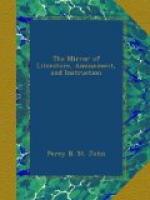That the Author of Waverley is a master of the pathetic, is evinced by several well-known passages. Such are the funeral of the fisherman’s son in the Antiquary—the imprisonment and trial of Effie Deans, and the demeanour of the sister and the broken-hearted father—the short narrative of the smuggler in Redgauntlet—many parts of Kenilworth—and of that finest of tragic tales, the Bride of Lammermoor.
Plots.
The plots in the Waverley Novels generally display much ingenuity, and are interestingly involved; but there is not one in the conduct of which it would not be easy to point out a blemish. None have that completeness which constitutes one of the chief merits of Fielding’s Tom Jones. There is always either an improbability, or a forced expedient, or an incongruous incident, or an unpleasant break, or too much intricacy, or a hurried conclusion. They are usually languid in the commencement, and abrupt in the close; too slowly opened, and too hastily summed up. Guy Mannering is one of those in which these two faults are least apparent. The plot of Peveril of the Peak might perhaps, on the whole, have been considered the best, if it had not been spoiled by the finale.
Scott and Shakspeare.
It may be said of the novels of Sir Walter Scott, as of the plays of Shakspeare, that though they never exhibit an attempt to enforce any distinct moral, they are, on the whole, favourable to morality. They tend (to use a common expression) to keep the heart in its right place. They inspire generous emotions, and a warm-hearted and benevolent feeling towards our fellow-creatures; and for the most part afford a just and unperverted view of human character and conduct. In them a very sparing use is made of satire—that weapon of questionable utility—which perhaps has never yet done much good in any hands, not even in those of Pope or Young. Satire is thought useful, too much because it gratifies the uncharitableness of our nature. But to hold up wisdom and virtue to our admiration, is better than to apply the lash, however dexterously, to vice and folly. There are, perhaps, no fictions exciting the imagination so strongly as the Waverley Novels, which have a less tendency to corrupt the heart; and it is, chiefly, because they do not exhibit flattering and delusive pictures of crime. In this again they resemble the plays of Shakspeare. Forcibly as that great dramatist has depicted vice, and ably as he has sometimes shown its coexistence with physical energy and intellectual superiority,—much as he may teach us to admire the villain for some of his attributes, he never confounds the limits of right and wrong. He produces no obliquity in our moral sense, nor seduces us to lend our sympathy against the dictates of our better reason. Neither in his graver, nor in his gayer scenes, is there aught which can corrupt. He invests profligacy with no attractive colours, nor lends a false and imposing




